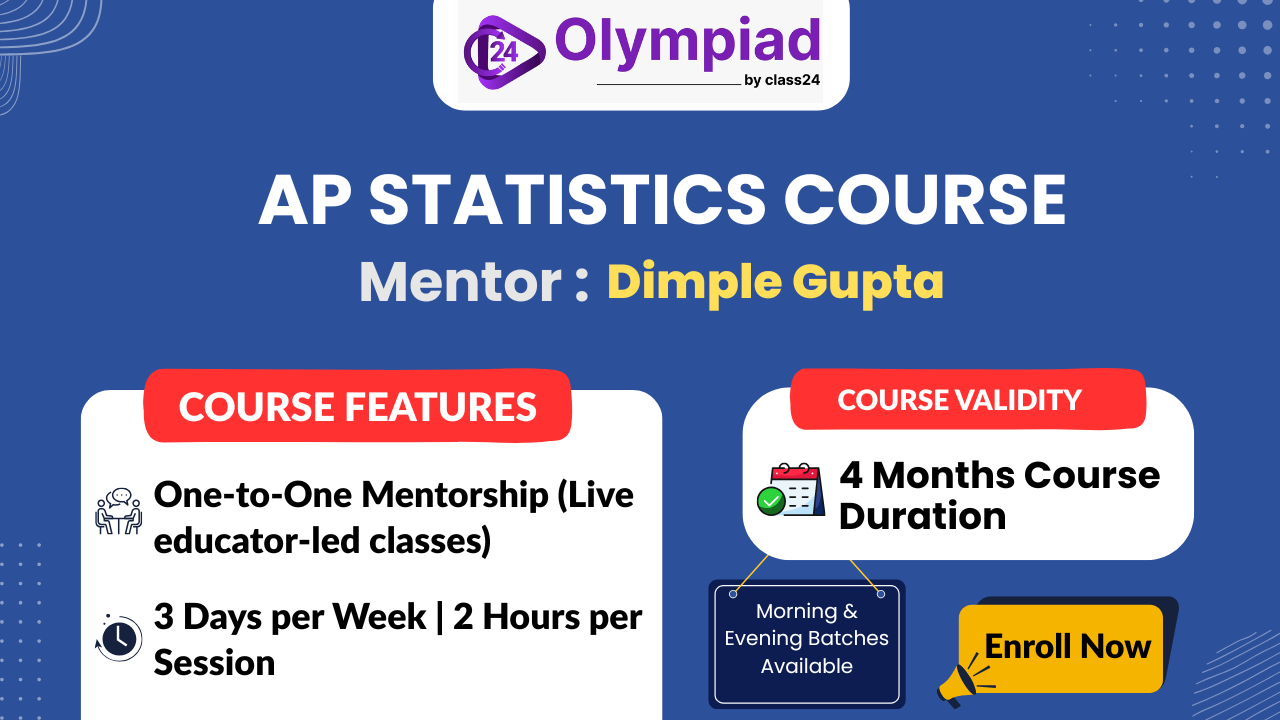About AP Statistics
AP Statistics is an undergraduate course that aims to educate students on how to collect, analyze, and interpret data.The course provides both theory and practicality and helps prospective students who may later pursue studies in mathematics, economics, psychology, biology, political science, business and other data-driven subjects.Students have the opportunity to learn how to design surveys and experiments, probability models, and inferential methods to solve real-life problems.
AP Statistics Course Units
The AP Statistics course follows the AP Exam model and has been divided into four major units.
- Unit 1: Exploring One- and Two-Variable Data (15–25% Exam Weighting)
- 1.1: Introduction to Data and Variables
- 1.2: Graphical Representations - dot plots, histograms, box plots
- 1.3: Numerical Measures - mean, median, IQR, standard deviation
- 1.4: Comparing Distributions and Identifying Outliers
- 1.5: Scatterplots, Correlation, and Least-Squares Regression
- 1.6: Residuals and Interpretation of Regression Lines
- Unit 2: Collecting Data (10–15% Exam Weighting)
- 2.1: Sampling Methods - Random, Stratified, Cluster, Systematic
- 2.2: Bias and Sources of Error
- 2.3: Designing Experiments - Treatments, Control, Randomization, Replication
- 2.4: Observational Studies vs Experiments
- 2.5: Randomization and Simulation Based Methods
- Unit 3: Probability, Random Variables, and Probability Distributions (20–30% Exam Weighting)
- 3.1: Rules of Probability and Conditional Probability
- 3.2: Independence and Multiplication Rule
- 3.3: Random Variables - Discrete and Continuous
- 3.4: Binomial and Geometric Probability Models
- 3.5: Normal Distribution and Z-Score
- 3.6: Sampling Distribution and Central Limit Theorem
- Unit 4: Inference – Estimation and Hypothesis Testing (30–40% Exam Weighting)
- 4.1: Confidence Intervals for Proportions and Means
- 4.2: Significance Tests for Proportions and Means
- 4.3: Chi-Square Test - Goodness-of-Fit, Homogeneity, Independence
- 4.4: Inference for Slope in Regression Models
- 4.5: Communicating Results and Drawing Conclusions in Context
Professional Online Tutoring in Science & Math
Unlock your child’s true potential with expert-led, interactive online classes that make complex concepts simple, spark curiosity, and build lasting confidence in STEM subjects.
- Customized learning plans for every grade
- Live, engaging sessions with experienced educators
- Globally aligned curriculum for future-ready skills
Book a 1-on-1 Counseling Session

Benefits of AP Statistics
- College-Level Preparation: Build statistical reasoning skills applicable to diverse fields including business, economics, psychology, and biology.
- Critical Thinking: Learn how to interpret data, assess reliability, and model uncertainty.
- Real-World Application: Apply statistical methods to real-life contexts such as elections, surveys, healthcare, and business decisions.
- Technology Integration: Use graphing calculators, spreadsheets, and simulations to analyze and model data.
- College Credit Opportunity: Earn college credit or advanced placement after achieving a qualifying AP Exam score.
Why Choose Us?
We provide expert-led AP Statistics learning designed to simplify data analysis, strengthen problem-solving, and prepare students for the AP exam with confidence.
Expert Instruction
Professional AP Statistics tutors who can make the process of data analysis easy and interesting.
Complete Coverage
Each unit and topic covered on the AP Statistics exam is taught in detail and rigorously.
Practice-Focused Learning
AP-style FRQs, MCQs, simulations, and case studies for thorough exam preparation.
Technology Training
Advice on the efficient use of calculators and software-related analysis.
What We Offer?
Students enrolled in our AP Statistics program receive:
- Structured, step-by-step notes for each topic.
- Calculator walkthroughs and practice using statistical tools.
- Real-life applications of probability and inference.
- AP-style FRQ/MCQ practice with detailed solutions.
- Full-length mock exams with score analysis.
- Ongoing feedback and performance improvement strategies.
AP Statistics Practice Paper 2012
Download the official AP Statistics Practice Exam 2012 – Section I (Multiple-Choice) PDF. This paper contains 40 questions to be solved in 90 minutes, contributing 50% of the exam score. Practicing these questions will boost your accuracy and exam readiness.



